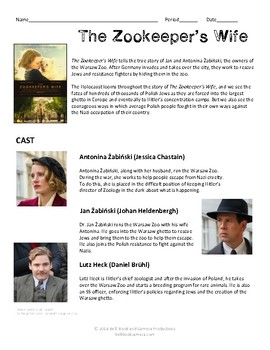

I mean, they weren’t necessarily extraordinary. Honoring so many souls that perished and shining a light on this very ordinary couple. No, concerns at all beyond doing it right and doing it well. Did you have any concerns about making a holocaust film in the first place? Or a holocaust film that’s focused on non-Jews saving Jews?
The zookeepers wife movie#
And this is kind of ultimately what drew me to tell a holocaust story ’cause it was so different and I felt that this time while, hopefully honoring the millions that died, a movie that could focus on a few hundred that survived and the extraordinary circumstances of these survivals would be a nice thing to put into the world.” But she used her gift to tend to these damaged Holocaust survivors and created an environment for them that was made bearable with art and music and tenderness and understanding.Īnd ultimately, I think, with hope. She had to overcome her natural shyness because she was much more, comfortable with animals than with people. NC: “In sheltering them she not only created kind of refuge and shelter but she also created a home. I was also really inspired by Antonina’s courage and her care and her compassion, because she sheltered Jews at great risk to herself and her family, but for no other reason than it was the right thing to do.” Very exotic, very domestic and very, very female in its focus. As to what drew me, I guess I was really compelled by the idea of a different kind of Holocaust maybe. Antonina Zabinski’s story had kind of fallen through the seams of history and I was amazed when I read the script to learn that it was a true story. In fact, that was part of the attraction to it. I had not read The Zookeeper’s Wife before I was approached.

But when you come out of the theatre more thrilled with the real story than the film itself, the latter owes much more to the former and not the other way around.Q: Did you read The Zookeeper’s Wife prior to any kind of discussions about the film? And whenever it came to your attention, what appealed to you about the book? Stories such as this need to be told to the larger world and movies, by virtue of being a mass medium, do a great service in that respect – I was unaware of this episode in Nazi history. Part of the reason could be the predictability of Antonina – who does everything we expect from a noble, well-intentioned character such as her. But it is not good enough to sustain our interest over its 127 minutes run time, especially since we know where it’s heading. The story is powerful in itself to warrant that. It isn’t even that you don’t care for the characters.

As a result, a large part of The Zookeeper’s Wife feels like a familiar WW II movie about Nazi defiance. The staid, period-piece-treatment doesn’t help. The other “rescues" don’t have the necessary dramatic tension either. The fact that Heck thinks he is as a superior zoologist to Jan amps up the tension between them.īut the movie’s unique, metaphoric central premise - of humans hiding in cages meant for animals at the Zabinski’s basement - doesn’t achieve its fruition. Unlike Heck, they stick to their principles after the shift in power. He is interested in Antonina and the film’s most engaging portions are the dynamics between him and the Zabinskis, who are the opposite of him, selfless volunteers in German-occupied Poland with incredible compassion for humans and animals alike.
The zookeepers wife full#
Bruhl, gifted with an interesting, puckish face, effectively plays a man who wants to gain full control but can’t help with the vulnerabilities of the human heart. Heck is a fascinating character – more fascinating than the zookeeper and his wife - and the film, directed by Niki Karo, thankfully, gives him the footage he deserves. By going back to hunting aurochs, Heck and his compatriots theorized, would enable Germans to reconnect with their roots and thus help in the Nazi propaganda. But he is known more for his obsession with bringing back aurochs - a type of primeval wild cattle which pure-blood Germans used to hunt for game - by selective breeding within existing domestic animals. The Zookeeper’s Wife is adapted from a book, which in turn based on Antonina’s diary, and Heck, in real life, who was a Nazi stooge, supplied lion cubs to officers and other more wilder animals to the zoos in Germany. Turns out that the Nazi idea of racial purity and Aryan aggressive masculinity extended to animals too we see feebler creatures like birds and monkeys being mercilessly killed.


 0 kommentar(er)
0 kommentar(er)
